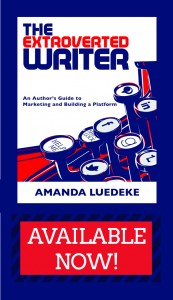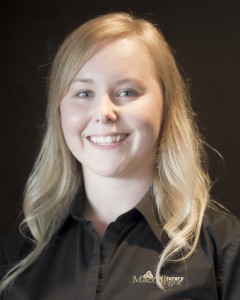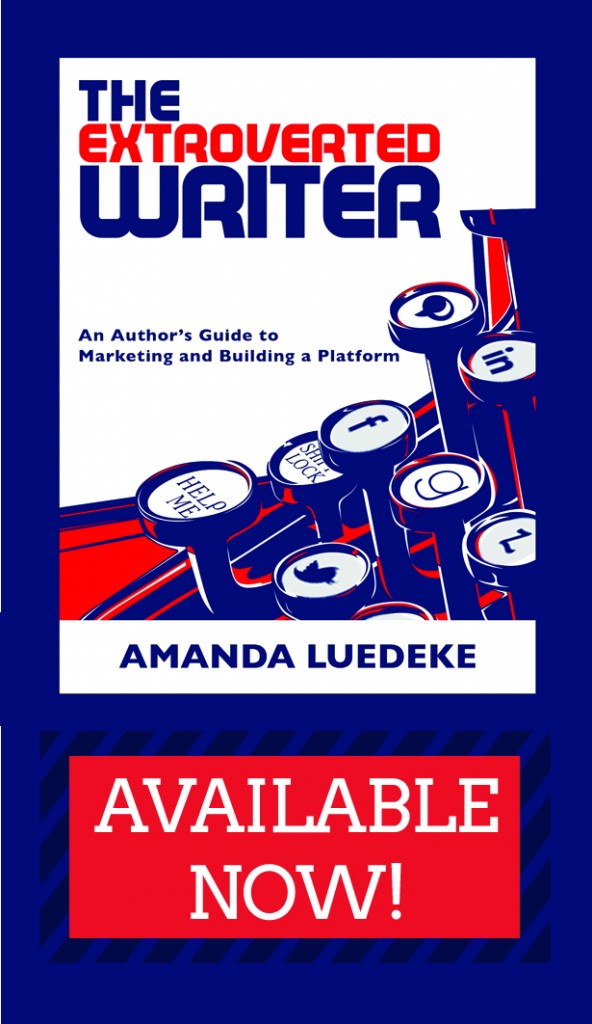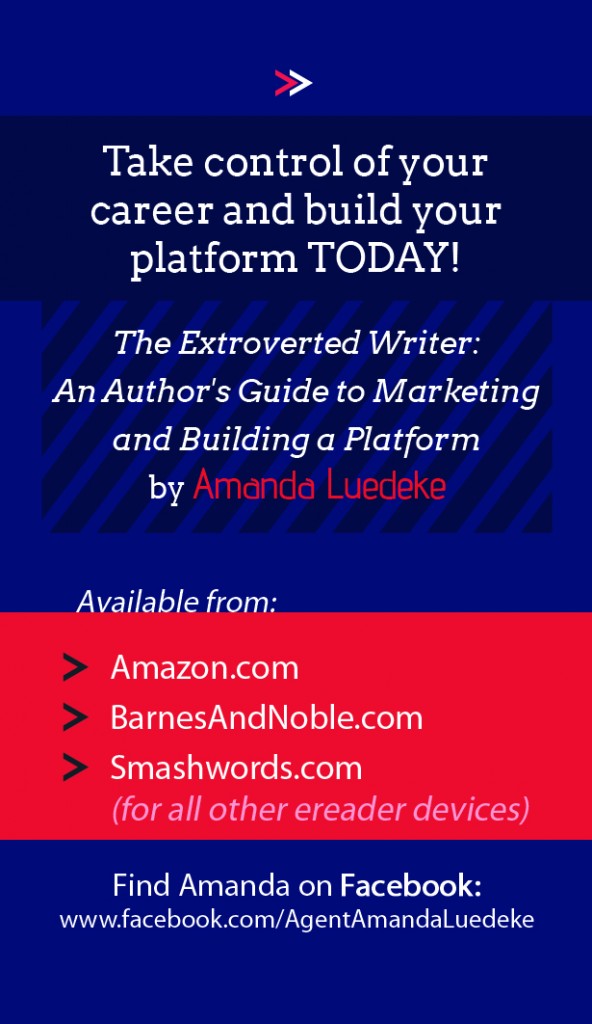- Agents
- Author News, Deals
- Awards
- Bad Poetry
- Blog News
- Books
- Career
- CBA
- Collaborating and Ghosting
- Conferences
- Current Affairs
- Deep Thoughts
- Favorite Books
- Featured
- Film
- Marketing and Platforms
- Proposals
- Publishing
- Questions from Beginners
- Quick Tips
- Religion
- Resources for Writing
- Self-Publishing
- Social Media Critique
- The Business of Writing
- The Writing Craft
- Thursdays with Amanda
- Trends
- Uncategorized
- Web/Tech
Category : Marketing and Platforms
-
Continue Reading "Thursdays with Amanda: How to Find Time to Market and Write and Not Give Up on Life"
Thursdays with Amanda: How to Find Time to Market and Write and Not Give Up on Life
 Amanda Luedeke is a literary agent with MacGregor Literary. Every Thursday, she posts about growing your author platform. You can follow her on Twitter @amandaluedeke or join her Facebook group to stay current with her wheelings and dealings as an agent. Her author marketing book, The Extroverted Writer, is available from Amazon and Barnes & Noble.
Amanda Luedeke is a literary agent with MacGregor Literary. Every Thursday, she posts about growing your author platform. You can follow her on Twitter @amandaluedeke or join her Facebook group to stay current with her wheelings and dealings as an agent. Her author marketing book, The Extroverted Writer, is available from Amazon and Barnes & Noble.One of the top questions or complaints I get when discussing the whole “You HAVE to market your book!” thing with authors is the time factor…and the fact that there is not enough of it.
“When do I find time to write?”
“How do I prevent from getting sucked into the social media world?”
“How do you strike a balance between writing and marketing?”
I hear these questions time and again, and they always come from authors who are wearing panicked expressions as the reality sets in that yes, marketing is an absolute must, and yes, the brunt of the marketing burden is theirs to bear, and no, after you get your publishing deal, writing the next book doesn’t get any easier mentally or physically or emotionally.
And my knee-jerk response?
We make time for the things that are important to us. I’ve never met an author who didn’t have time to read the next installment in their favorite series…or who wasn’t able to catch the latest episode of Downton Abbey/Doctor Who/Castle/etc., even if it mean DVR-ing it…or who failed to show up for their day job because they were too busy.
It’s all about priorities, and for most authors, marketing simply isn’t a priority because it’s viewed as WORK. And even worse, it’s a form of WORK that doesn’t result in a paycheck at the end of the week. As far as the author knows, it may NEVER result in a paycheck. So that’s where the trouble sets in.
It’s a mind game, really. I’ve had authors who
-
Continue Reading "A Wednesday with Amanda: 5 Essential Rules of Blogging"
A Wednesday with Amanda: 5 Essential Rules of Blogging
 For today’s post, I wanted to share with you another excerpt from my book, The Extroverted Writer. This one is taken from the chapter on Blogs:
For today’s post, I wanted to share with you another excerpt from my book, The Extroverted Writer. This one is taken from the chapter on Blogs:There are a ton of books on blogging. Each will probably offer you more information than what I’m about to present, and they may even do so in a more entertaining fashion—bells, confetti, and joke after joke after joke. But I’ve been blogging for awhile now, and I’ve also read a lot of equally great and bad blogs. In an effort to condense everything into a digestible sub-section, I’ve identified a few of the many rules of blogging. These are the rules I see broken, mangled, and abused most often. And these are the rules that will quickly make your blog a zillion times better (or thereabouts) should you uphold them.
Five Important and Essential Rules of Blogging
1. Stick to the goal. I can’t stress it enough. Your blog absolutely must have a goal.Whatdo you want your blog to accomplish? Structure your posts around that goal.
Do you want to promote yourself as an author/speaker/expert? Do you want to promote your book? Do you want to connect with fans? Do you want to offer an online experience that ties in with your book? These are important questions, and without answering them, your blog will turn into a mush of information.
For example, many in the publishing industry have come to know and love Chip MacGregor’s blog. He provides valuable information on the industry and is a huge help to writers. But what would happen if Chip suddenly started blogging about the Oregon Ducks? He certainly loves them enough to do so, and those who know him know he isn’t shy about his affections. What if every other post was a recap of their games and dealings? And then what if he shifted gears with his blog on the weekends and
-
Continue Reading "Thursdays with Amanda: Working with a Designer"
Thursdays with Amanda: Working with a Designer
 Amanda Luedeke is a literary agent with MacGregor Literary. Every Thursday, she posts about growing your author platform. You can follow her on Twitter @amandaluedeke or join her Facebook group to stay current with her wheelings and dealings as an agent. Her author marketing book, The Extroverted Writer, is available from Amazon and Barnes & Noble.
Amanda Luedeke is a literary agent with MacGregor Literary. Every Thursday, she posts about growing your author platform. You can follow her on Twitter @amandaluedeke or join her Facebook group to stay current with her wheelings and dealings as an agent. Her author marketing book, The Extroverted Writer, is available from Amazon and Barnes & Noble.On Monday, I posted the PDF designs of the business cards that I have been using to promote my book, The Extroverted Writer, at conferences. Now, in my book I talk a bit about working with a designer. And, coming from a marketing background in which a lot of the work we did involved print design, I do know a thing or two about making designers happy. But since having my cards made, I feel I have a lot more advice to add to the table. So, here goes…
5 Tips on Working with a Designer
1. Know your specs! While designs can many times be easily shrunk down, they should NEVER be expanded. Expanding or stretching a design will absolutely ruin it. Furthermore, designs/photos used on the web can be of a lower quality than designs used in print. Communicating exact dimensions (including any bleed space) as well as whether the design is for web or print is crucial to avoiding design disasters.
2. Communicate what you want! If you have an idea of what you want the design to look like, let the designer know. They aren’t mind-readers and will 100% of the time come to you with a design that looks nothing like what you’d been envisioning. I have found that it often helps to provide visuals for a designer to work from. To design www.PlaylistFiction.com, I sent the designer a number of stock photography examples of textures and colors so that she could get the feel of what we were going for.
-
Continue Reading "A Wednesday with Amanda: Finding Your Audience Is as Easy as Watching a Movie"
A Wednesday with Amanda: Finding Your Audience Is as Easy as Watching a Movie
 Amanda Luedeke is a literary agent with MacGregor Literary. Every Thursday, she posts about growing your author platform. You can follow her on Twitter @amandaluedeke or join her Facebook group to stay current with her wheelings and dealings as an agent. Her author marketing book, The Extroverted Writer, is available from Amazon and Barnes & Noble.
Amanda Luedeke is a literary agent with MacGregor Literary. Every Thursday, she posts about growing your author platform. You can follow her on Twitter @amandaluedeke or join her Facebook group to stay current with her wheelings and dealings as an agent. Her author marketing book, The Extroverted Writer, is available from Amazon and Barnes & Noble.We’re talking about my book this week on the blog (if you haven’t noticed), and so I wanted to share this excerpt with you.
In The Extroverted Writer, I don’t just talk social media. I talk about truly identifying your audience. Because without a handle on who your readers are (what they look like, what they enjoy doing, what they spend their money on, etc.), you’re bound to enact a bunch of marketing efforts that won’t even come close to reaching them. In other words, you’re bound to waste your time.
In the book, I provide a number of strategies and tips on identifying your audience, and this one is my favorite…
The Theater Test
My parents really wanted to see the movie The Iron Lady, a biopic about Margaret Thatcher. So, the three of us went to the theater and took our seats. I really enjoyed the movie and found it quite moving, so much so that I would probably recommend it to my friends if the subject came up.Right after the movie ended and the lights came back on, I remember standing up and realizing that I was younger than everyone else in the room by at least twenty years (I was twenty-eight at the time). Not only that, but I realized that almost everyone there was with his or her spouse. And they were all white people, probably conservatives (they had that look about them), and they seemed to fall in the middle or upper middle class.
Okay, so basically, they were all
-
Continue Reading "Amanda's "The Extroverted Writer""
Amanda's "The Extroverted Writer"
When Amanda Luedeke (an agent who works with me at MacGregor Literary) told me she was writing a book entitled The Extroverted Writer, I laughed. I mean… let’s face it — most writers are simply not extroverts. They tend to be thinkers, who often sit in front of their computers, or who stare out the window, pondering life and characters (and, at least in my case, who they’re going to murder next and how they’re going to get away with it). Sure, there are some writers who are actually extroverts, but in my experience they tend to be in the minority.
But I saw where Amanda was going with her title… Even an introverted writer can use social media to get out there and meet people. He or she can start tweeting, or post thoughts on a blog, or get involved with friends via Facebook, or do many of the hundred other activities available on the web to build a readership. In other words, an introvert can become, in some ways, an extrovert, introducing herself to other people. And, the more I thought about it, the more I liked that concept.
You see, I’m one of those people who sees the internet as being similar to a book. Books aren’t read by groups (at least not past first grade). They are read by individuals, so a book is really an author telling a story to one person at a time. Reading is an individual experience — as is most social media. It’s personal, with the author having a bunch of one-on-one conversations with individuals. And the more a writer does that, the more he or she has a chance to build a community of friends and readers.
Think of the benefits of a strong social media community. There’s a chance for an author to define her voice. There is an opportunity to get close to people, and thereby have an
-
Continue Reading "A Monday with Amanda: Book Promo Cards"
A Monday with Amanda: Book Promo Cards
 Amanda Luedeke is a literary agent with MacGregor Literary. Every Thursday, she posts about growing your author platform. You can follow her on Twitter @amandaluedeke or join her Facebook group to stay current with her wheelings and dealings as an agent. Her author marketing book, The Extroverted Writer, is available from Amazon and Barnes & Noble.
Amanda Luedeke is a literary agent with MacGregor Literary. Every Thursday, she posts about growing your author platform. You can follow her on Twitter @amandaluedeke or join her Facebook group to stay current with her wheelings and dealings as an agent. Her author marketing book, The Extroverted Writer, is available from Amazon and Barnes & Noble.Last Thursday, I blogged about why creating STUFF doesn’t work when it comes to marketing and selling books. In the post I talk about a card that I created for my marketing book. Here’s what I said:
I have cards on hand for my marketing ebook. I give these away at conferences. It works like a gem. But the big deal isn’t that I have the cards…it’s that I’m AT the CONFERENCES. I’m pounding the pavement. And then I’m sealing the deal with the card.
Imagine if I sat home. If I had a book to promote and a bunch of cards that I didn’t know what to do with. I’d end up with TWO things to promote. Two items that need marketing plans and Twitter campaigns and Facebook strategies (though I realize the idea of a Facebook strategy for a card is a bit silly…you get my point).
One commenter asked to see an example of the card, and though I still hold firm that it is not the card that matters…it’s my presence at the conference…I figured it may be helpful to show you what info I included (and excluded) on the card.
It’s a business-sized card, and it has a front and a back:
Jam-packed on this card are the following:
1) Cover image
2) A sense of urgency and hype in place of a blurb or endorsement (Available Now!)
3) A hook that answers a NEED authors have. I mean who doesn’t want to take control and build their platform starting
-
Continue Reading "Thursdays with Amanda: Why Creating “Stuff” Is a BAD Marketing Move"
Thursdays with Amanda: Why Creating “Stuff” Is a BAD Marketing Move
 Amanda Luedeke is a literary agent with MacGregor Literary. Every Thursday, she posts about growing your author platform. You can follow her on Twitter @amandaluedeke or join her Facebook group to stay current with her wheelings and dealings as an agent. Her author marketing book, The Extroverted Writer, is available from Amazon and Barnes & Noble.
Amanda Luedeke is a literary agent with MacGregor Literary. Every Thursday, she posts about growing your author platform. You can follow her on Twitter @amandaluedeke or join her Facebook group to stay current with her wheelings and dealings as an agent. Her author marketing book, The Extroverted Writer, is available from Amazon and Barnes & Noble.If you don’t mind, I’m going to pull out my soapbox and set up a Ted Cruz-sized camp. I’m going to talk about the strategy of CREATING more STUFF in an attempt to PROMOTE your BOOK and why this strategy is a complete waste of time.
I see author after author spend money and time on book trailers and digital shorts and book-specific websites and splash pages and artwork and THINGS. I see their eyes light up when they realize, for example, “I’m great in the kitchen!” and then they decide that being great in the kitchen means they should create some recipes that are pulled straight from their book and they should offer these recipes online BECAUSE THAT WILL DEFINITELY GET PEOPLE BUZZING!
But then no one downloads the recipes.
Why?
No one knows they’re there. Which happens to be the very reason that a book (your book) may do poorly. It’s not because the book is bad or boring or poorly written. It’s because no one knows it exists.
Marketing is all about showing and telling people that something exists and then convincing them (in a soft, casual way) that they need said thing.
So let’s really dig in to the madness behind this “create” mentality…
You have a book. Yay! You hope people buy the book. I mean you’ve told your friends and family, right? That should count for SOMETHING.
But the numbers come back. Sales are bad. You haven’t even cracked 2,000 copies sold. You need to DO something. In pops this recipe idea. GREAT!
-
Continue Reading "Thursdays with Amanda: Answering Your Marketing Questions"
Thursdays with Amanda: Answering Your Marketing Questions
 Amanda Luedeke is a literary agent with MacGregor Literary. Every Thursday, she posts about growing your author platform. You can follow her on Twitter @amandaluedeke or join her Facebook group to stay current with her wheelings and dealings as an agent. Her author marketing book, The Extroverted Writer, is available from Amazon and Barnes & Noble.
Amanda Luedeke is a literary agent with MacGregor Literary. Every Thursday, she posts about growing your author platform. You can follow her on Twitter @amandaluedeke or join her Facebook group to stay current with her wheelings and dealings as an agent. Her author marketing book, The Extroverted Writer, is available from Amazon and Barnes & Noble.Awhile back, I asked for some topic suggestions. I received a range of questions and ideas, and so I’m going to address some of the smaller (but still important!) questions here…and keep in mind that Thursdays with Amanda is all about marketing and platform. So the questions that fell outside of that range probably won’t get answered here.
1. Lisa wrote “Sometimes, I just feel so burnt out of the social media, platform building. I always love hearing tips about having a healthy balance.”
ANSWER: It’s important to note that there is not one-size-fits-all approach here. Some get lost in the social media abyss while others are very good about being intentional with their time. So please understand that what works for you may not work for others and vice versa. With that being said, here’s a BIG soapbox of mine…
I’ve had a few authors this year complain that there isn’t time for marketing. These are authors who 1) do not maintain any sort of real world job, and 2) do not have kids in the house that need supervision. So you can imagine I have little pity for them, considering I work with an author who is a single parent of FIVE as well as a full-time minister.
So a general rule that I throw out there is to treat writing and marketing as equals. One hour of writing for every hour of marketing. If you are afraid that this rule will leave you with barely any writing time, then it may be time to cut
-
Continue Reading "'Novel Crossing' One Year Later: A Marketing Perspective"
'Novel Crossing' One Year Later: A Marketing Perspective
Today we’re featuring a guest blog from Amy Haddock, Senior Marketing Manager at Waterbrook Multnomah, a division of Penguin Random House. Amy helped create the popular “Novel Crossing” website for inspirational fiction readers…
Writing a book is one thing. Getting that book discovered by readers is a whole other thing, right? It doesn’t take long to see that marketing a book can be an exhausting labor of love. As a marketer myself, I understand completely. For me, the goal is always to find readers, connect them with new books that they would like, and to get them to share it with their friends. As simple as that sounds, we all know that to get to this end result requires hours and hours of work, careful educated guesswork, detailed information about these consumers, a collaborative partnership between publishing house and author, and a way to target these readers as a group. That’s why I’m excited to tell you about Novel Crossing. But I’m getting ahead of myself.
The first thing I should probably tell you: I love books. I’m enamored with reading. I have whole bookcases full of titles from decades past that show just how long I’ve had my nose perpetually in a book, but more than that, I love Christian fiction. I grew up on Janette Oke, Gilbert Morris, and Robin Jones Gunn—reading that my Mom deemed “safe” from her own bookshelves—and during countless moves from city to city during my formative years, these books were my constant companions.
I’ll admit, I struggled during my college years to retain my love for reading. I became a “skimmer” extraordinaire to make it through the stacks of articles and textbooks that professors gleefully assigned. Looking back, I realize they were just doing their job but at the time it was all I could do to stuff enough knowledge into my brain to pass my courses, let alone pick up a read-for-fun
-
Continue Reading "Thursdays with Amanda: How to Throw a Book Launch Party"
Thursdays with Amanda: How to Throw a Book Launch Party
 Amanda Luedeke is a literary agent with MacGregor Literary. Every Thursday, she posts about growing your author platform. You can follow her on Twitter @amandaluedeke or join her Facebook group to stay current with her wheelings and dealings as an agent. Her author marketing book, The Extroverted Writer, is available from Amazon and Barnes & Noble.
Amanda Luedeke is a literary agent with MacGregor Literary. Every Thursday, she posts about growing your author platform. You can follow her on Twitter @amandaluedeke or join her Facebook group to stay current with her wheelings and dealings as an agent. Her author marketing book, The Extroverted Writer, is available from Amazon and Barnes & Noble.Well, it’s not Thursday…it’s Friday, but for the sake of Brand you’ll have to suffer through my wrongly-titled post.
We’re all back from ACFW, which proved to be a bunch of fun, as always, but also quite interesting in terms of industry stuff. But something happened there that rarely ever happens at any conference…ever.
A literary agency threw a launch party.
You may have heard/read me talk about Playlist Fiction. In thinking about how to help the authors create awareness and buzz we considered what most publishers/authors consider. We considered running an ad. But let’s face it:
1. Ads are expensive
2. Ads get buried by other ads
3. Ads are forgetful
So when Chip asked me what my ideal method of creating buzz at ACFW would be, I said a party! Which of course meant it became my responsibility, but I took it on happily.
Here’s how I did it…
- We got some big names to agree to attend, and we asked them to read excerpts from the books our authors did
- We created invites (we had a Facebook event page, a physical paper invite, and we hit up the big My Book Therapy e-blast as well as a few blogs)
- We secured a local venue (Buca di Beppo) and promised free dessert (I mean hello! ACFW is 90% women. There was no way we could lose here)
- We got the go-ahead from the conference directors and made sure that our time slot wouldn’t interfere with ANYTHING
- We unashamedly mentioned the party during the agent panel




